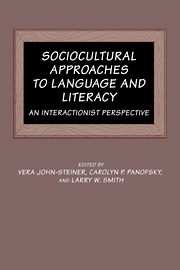Part 1 - Context
Published online by Cambridge University Press: 05 November 2011
Summary
Although Vygotsky did not write extensively specifically about the concept of context, all of his work implies the importance of context both at the level of individual speech acts (whether in inner speech or social dialogue) and at the level of historical and cultural patterns of language use. Vygotsky's work (as well as that of others) has been an impetus in the development of the recognition of the need to pay close attention to context in studies of language use. For example, an interactionist approach following Vygotsky is readily compatible with recent developments in such linguistics- and language-associated fields as sociolinguistics, discourse analysis, pragmatics, and the ethnography of communication, precisely because Vygotsky recognized the importance of both immediate contextual constraints and the wider social, historical, and cultural conditions of language use.
An integral part of an interactionist approach to language use and literacy is the recognition that context is a constitutive factor in language use, in the social construction of meaning. Actually, any of the papers collected in this volume could be used to illustrate the primary importance of the recognition of context for a study using an interactionist approach. The papers introduced in this section, then may be taken as varied examples of how the concept of context may be used in interactionist studies. One point that may be noticed about the particular three studies in this section is that they all, in one way or another, intentionally vary contexts in order to collect data and observations that can be used to compare language use in different contexts.
- Type
- Chapter
- Information
- Sociocultural Approaches to Language and LiteracyAn Interactionist Perspective, pp. 35 - 42Publisher: Cambridge University PressPrint publication year: 1994

